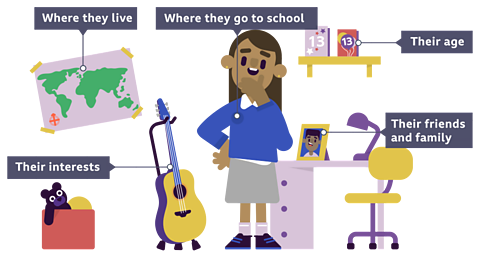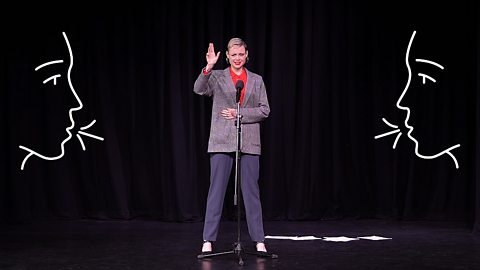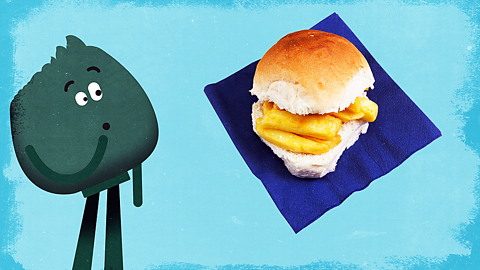What do you know?
Prick up your shell-likes and let this page give you the skinny on some hip lingo! What do you think this means?
That sentence uses a lot of slang terms from all different places and periods of history but it basically means, pay attention and let this page tell you all about a type of language called slang.
Introduction to slang
Key learning points
- What is slang?
- Where did slang come from?
- When and where itтs okay to use slang
- What makes slang different from Standard English?
Video about slang
A video about slang, where it came from and in what situations it is ok to use to slang
Time for some new words: slang.
New? Who am I kidding? Thereтs nothing new about slang. The term тslangт has been around since 1756 and was originally used to describe words and language used by disreputable people.
For example, you can hear some of this in the way the pickpockets speak in the Charles Dickens novel Oliver Twist, originally written in the 1830s:
When The Artful Dodger tells Oliver he is тgreenт, he means that he is innocent т and when he calls him тcoveyт, this is just a way to describe a friend or associate.
Nobody says covey today but instead they might say тmuckerт or тmateт or тbestieт - whatever slang words feel right to you and whoever youтre talking to.
Thereтs nothing wrong with slang in the right context. It is often used by particular groups of people.
For example, you might use words with your friends that you donтt use when speaking to family, teachers or in a shop. Slang can be generational. It is also developed through activities, music or sports.
Thereтs all kinds of slang, much of it is a creative use of language and some of it even rhymes. And it can be localised too.
Cockney rhyming slang dates back to the East End of London in the early 19th century. People go тup the apples and pears to Uncle Nedт - тApples and pearsт was rhyming slang for тstairsт, тUncle Nedт was rhyming slang for тbedт.
Slang is colloquial language and it should only be used in informal settings and among friends. If a news presenter used slang, or a doctor, or a teacher it might sound odd.
Amirite?
What is slang?
Slang a type of informal language that is more often used in speech than in writing. Slang varies between different groups of people, but some examples of slang that you might have heard include:
- тcoolт т something good
- a тquidт т ТЃ1
- тguttedт т devastated
- тnot fussedт т you donтt mind or donтt have a preference
- тchippyт т a fish and chip takeaway
You might not recognise all of these words. This is because slang varies a lot between different groups of people, depending on many things including how old they are and where they live.
One of the reasons why slang is so popular is that it allows members of smaller groups to talk to each other about things that people outside of that group might not understand. You might have felt this if you have ever used slang with your friends, knowing that others who hear you might not understand what you mean.
Language of identity
The way we speak is a big part of our identity. People might speak in different ways for many different reasons, all linked to who they are. Some of these reasons include:
- where they live
- where their family come from
- where they go to school
- what they are interested in
- how old they are
- who they are friends with

You might notice that you use words that are different from the words that your parents or other adults might use for the same thing.
Slang is a type of informal language, so the definitions of words can change quite quickly. As long as people within the group using the word know what it means, it doesnтt matter if that meaning isnтt clear to people outside of the group.
Sometimes slang words become widely known and used, such as тcoolт but often slang stays very specific to a small group and isnтt widely used outside of that group.
History of slang
The English language is changing all the time, and slang changes even faster than more standard or formal types of language.
It usually takes a while for the definitions of slang words to be included in a dictionary, and their meanings might change in this time so they might be out of date before the definitions are even printed!
Because slang is mostly a spoken form, itтs difficult to know exactly when people started using slang. Itтs likely that there has always been a form of slang, but the first recorded examples of slang come from the 16th century, including some examples in Shakespeareтs work from the 1800s. The term тslangт itself has been around since 1756.
Slang was originally used to describe words and language used by disreputable people. It has been used as a way for groups of people to talk about things that they might not want to be overheard and understood by people outside of their group. Because of this, slang often included words for things that are a bit rude or impolite.
A really famous type of slang is Cockney rhyming slang which originated in the East End of London in the early 19th century. It uses words and phrases that rhyme with what they mean eg тapples and pearsт means тstairsт, and тdog and boneт means тtelephoneт.
Where and when slang is appropriate
It is useful to understand when different types of language are appropriate. Slang is perfectly fine to use when youтre talking to your friends and when youтre in informal situations with people who will understand the slang you use.
There are some situations where it wouldnтt be appropriate to use slang, for instance:
- when you are writing something for school
- when you need to be understood by a wide audience
- when you are speaking to someone who doesnтt understand the meaning of the slang you use
Some people have a negative opinion of slang. The negative opinion might come from the history of slang. Because slang was often used by groups of people who wanted to talk about things secretly, there is still a negative attitude towards slang.
As long as you use slang with others who understand you and in situations where it is appropriate, there is no problem with it.
Standard English and slang
Standard English is the name for a type of English that is widely understood. It is the type of English that youтre usually expected to use when you are writing at school.
This means that you should try to use words which could be looked up in the dictionary if someone didnтt understand them.
Itтs really important that you are able to communicate clearly in your writing, and in some situations using slang might make your meaning less clear to your reader.
However, if youтre writing creatively, slang can sometimes help to show readers about the identity of characters or your own identity.
Find out more about formal and informal writing.
Test your knowledge
Play Bitesize secondary games. gamePlay Bitesize secondary games
Have fun playing science, maths, history, geography and language games.

More on Spoken English
Find out more by working through a topic
- count5 of 5

- count1 of 5

- count2 of 5

- count3 of 5
